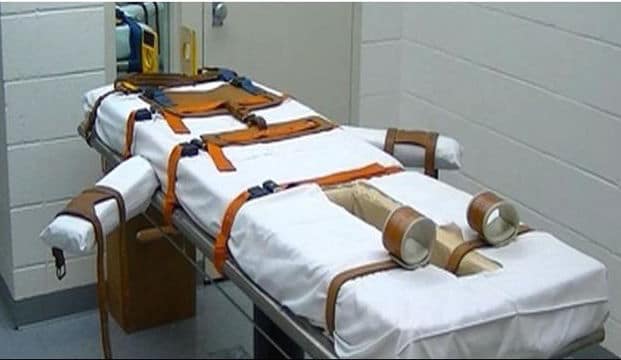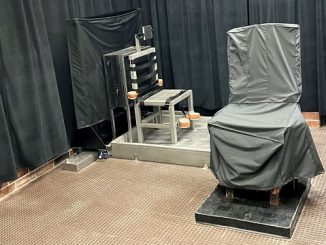
A judge has blocked Arkansas from using one of three lethal injection drugs the US state planned to use in a series of executions next week.
The Supreme Court of Arkansas has also granted an emergency stay of execution for one of two inmates scheduled to die on Monday.
In an unprecedented move, the state had planned to put seven prisoners to death over an 11-day period.
Lawyers said the state was acting unconstitutionally and recklessly.
Pulaski County Circuit Judge Wendell Griffen issued a temporary restraining order on Friday barring the state from administering one of the drugs used in its lethal injection cocktail.
The suppliers of the muscle relaxant, vecuronium bromide, argued that it had been sold to the prison system on the understanding it would be used solely for medical purposes.
Separately, a stay of execution was granted in the case of Bruce Ward, who was convicted of strangling to death Rebecca Doss, a teenage shop clerk who worked in Little Rock.
The executions in Arkansas had been arranged to take place before a batch of one of the drugs used by the state expires later this month.
The move has drawn international attention and has been condemned by rights groups as an “assembly line” and a violation of the US legal process.
On Thursday, two other pharmaceutical manufacturers asked a federal judge to bar the state from using their drugs.
Midazolam – one part of the three-drug lethal injection “cocktail” – is set to expire at the end of April, and has been criticised as contributing to several botched executions in other states.
Drug companies Fresenius Kabi USA and West-Ward Pharmaceuticals filed a motion as part of the federal lawsuit by the condemned inmates on Thursday, claiming that the drugs were secured in an improper manner, and could affect their ability to sell in Europe.
The companies said that it appears the drugs were procured through a third party, since the companies say they only sell to medical providers.
They also argue that the executions could limit their ability to trade in the European Union, which has prohibited the buying or selling of products used for capital punishment.
Governor Hutchinson earlier said he was confident that the drugs would work, and that he was satisfied that the prison staff could handle the executions.
A group of former prison officials had written to the governor in late March to say that the quick pace would place undue physical and emotional burden on prison staff.
But he dismissed that, saying that he had met them and “they don’t take it lightly”.
“I have a responsibility to the voters, I have a responsibility to my oath of office, but I also have responsibility to a higher power, God and eternity, and I understand that,” he said.
“I feel comfortable in my understanding of my responsibilities both in terms of faith and scripture and in terms of as governor,” he added.
Source: bbc.co.uk






Be the first to comment